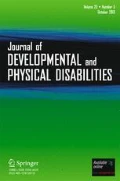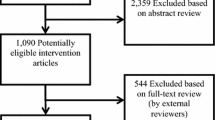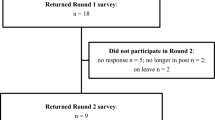Abstract
Pediatric feeding problems are highly prevalent in the general population and reportedly higher in populations of youth with disabilities. A variety of treatment approaches and settings have been explored yet challenges with generalization to home and community settings continue to be experienced. Telehealth enhanced interdisciplinary feeding services are one response to these challenges. This study described a model for outpatient feeding services serving clients with intellectual and developmental disabilities within a coordinated health care model through a telehealth enhanced clinic. Further a cost savings analysis demonstrated a savings in travel time and travel costs relevant to receiving services. Practical recommendations for practitioners who are interested in using telehealth enhanced services for pediatric feeding problems were discussed.
Similar content being viewed by others
References
Addison, L. R., Piazza, C. C., Patel, M. R., Bachmeyer, M. H., Rivas, K. M., Milnes, S. M., & Oddo, J. (2012). A comparison of sensory integrative and behavioral therapies as treatment for pediatric feeding disorders. Journal of Applied Behavior Analysis, 45(3), 455–471.
American Academy of Child and Adolescent Psychiatry (AACAP). (2008). Practice parameter for telepsychiatry with children and adolescents. Journal of American Academy of Child and Adolescent Psychiatry, 47(12), 1468–1483.
American Diabetes Association. Healthy eating. http://www.diabetes.org/are-you-at-risk/lower-your-risk/healthy-eating.html. Accessed January 15, 2017.
American Heart Association. The American Heart Association’s Diet and Lifestyle Recommendations. http://www.heart.org/HEARTORG/HealthyLiving/HealthyEating/Nutrition/The-American-Heart-Associations-Diet-and-Lifestyle Recommendations_UCM_305855_Article.jsp#.WJvkqIgrLnA. Published March 15, 2017. Accessed March 17, 2017.
American Institute for Cancer Research. Diet - What to Eat for Lower Cancer Risk. http://www.aicr.org/reduce-your-cancer-risk/diet/. Accessed January 25, 2017.
American Psychological Association. (2013). Guidelines for the practice of telepsychology. The American Psychologist, 68, 791–800.
Aponte, C. A., & Romanczyk, R. G. (2016). Assessment of feeding problems in children with autism spectrum disorder. Research in Autism Spectrum Disorder, 21, 61–72.
Armfield, N. R., Donovan, T., Bensink, M. E., & Smith, A. C. (2012). The costs and potential savings of telemedicine for acute care neonatal consultation: Preliminary findings. Journal of Telemedicine and Telecare, 18(8), 429–433. https://doi.org/10.1258/jtt.2012.GTH101.
Bandini, L. G., Anderson, S. E., Curtin, C., Cermak, S., Evans, E. W., Scampini, R., Maslin, M., & Must, A. (2010). Food selectivity in children with autism spectrum disorders and typically developing children. Journal of Pediatrics, 157(2), 259–264.
Bentovim, A. (1970). The clinical approach to feeding disorders of childhood. Journal of Psychosomatic Research, 14(3), 267–276.
Bergan, J. R., & Kratochwill, T. R. (1990). Behavioral consultation in applied settings. New York: Plenum.
Binnendyk, L., & Lucyshyn, J. M. (2008). A family-centered positive behavior support approach to the amelioration of food refusal behavior: An empirical case study. Journal of Positive Behavior Interventions, 11(1), 47–62.
Bloomfield, B. S., Fischer, A. J., Clark, R. R., & Dove, M. B. (2018). Treatment of food selectivity in a child with avoidant/restrictive food intake disorder through parent teleconsultation. Behavior Analysis in Practice. https://doi.org/10.1007/s40617-018-0251-y.
Bolte, S., Ozkara, N., & Poustka, F. (2002). Autism spectrum disorders and low body weight: Is there really a systematic association? International Journal of Eating Disorders, 31(3), 349–351.
Bosaeus, I. (2004). Fibre effects on intenstinal functions (diarrhea, constipation, and irritable bowel syndrome). Clinical Nutrition Supplements, 1, 33–38. https://doi.org/10.1016/j.clnu.2004.09.006.
Calvert, S. D., Vivian, V. M., & Calvert, G. P. (1976). Dietary adequacy, feeding practices, and eating behavior of children with Down’s syndrome. Journal of American Dietetic Association, 69, 152–156.
Chatoor, I., Hirsch, R., Ganiban, J., Persinger, M., & Hamburger, E. (1998). Diagnosing infantile anorexia nervosa. The observation of mother–infant interactions. Journal of the American Academy of Child Adolescent Psychiatry, 37, 959–967.
Clawson, E. P., & Elliott, C. A. (2014). Integrating evidence-based treatment of pediatrics feeding disorders into clinical practice: Challenges to implementation. Clinical Practice in Pediatric Psychology, 2(3), 312–321.
Cornish, E. (1999). A balanced approach towards healthy eating in autism. Top Clinical Nutrition, 14(4), 85.
Cornish, E. (2002). Gluten and casein free diets in autism: A study of the effects on food choice and nutrition. Journal of Human Nutrition and Diet, 15(4), 261–269.
Coulthard, H., & Harris, G. (2003). Early food refusal. The role of maternal mood. Journal of Reproductive and Infant Psychology, 21, 335–345.
Crist, W., McDonnell, P., Beck, M., Gillespie, C. T., Carrett, P., & Mathews, J. (1994). Behaviour at mealtimes and the young child with cystic fibrosis. Journal of Developmental and Behavioural Pediatrics, 15, 157–161.
Darke, P., & Goldberg, S. (1994). Father-infant interaction and parent stress with healthy and medically compromised infants. Infant Behavior and Development, 17, 3–14.
Dart, E. H., Whipple, H. M., Pasqua, J. L., & Furlow, C. M. (2016). Legal, regulatory, and ethical issues in telehealth technology. In J. K. Luiselli, A. J. Fischer, J. K. Luiselli, & A. J. Fischer (Eds.), Computer-assisted and web-based innovations in psychology, special education, and health (pp. 339–363). San Diego: Elsevier Academic Press.
Del Giudice, D., Staiano, A., Capano, G., Romano, A., Florimonte, L., & Miele, E. (1999). Gastrointestinal manifestations in children with cerebral palsy. Brain Dev, 21, 307–311.
Dietary Guidelines for Americans 2015–2020. Office of Disease Prevention and Health Promotion. https://health.gov/dietaryguidelines/2015/guidelines/. Published December 2015. Accessed 20 June 2018.
Duniz, M., Scheer, P., Trojovsky, A., Kaschnitz, W., Kvas, E., & Macari, S. (1996). Changes in psychopathology of parents of NOFT (non-organic failure to thrive) infants during treatment. European Child & Adolescent Psychiatry, 5(2), 93–100.
Farrow, C., & Blissett, J. (2006). Maternal cognitions, psychopathologic symptoms and infant temperament as predictors of early infant feeding problems. A longitudinal study. International Journal of Eating Disorders, 39, 128–134.
Field, D., Garland, M., & Williams, K. (2003). Correlates of specific childhood feeding problems. Journal of Paediatrics and Child Health, 39(4), 299–304.
Fischer, A. J., Luiselli, J. K., & Dove, M. (2015). Effects of clinic and in-home treatment on consumption and feeding-associated anxiety in an adolescent with avoidant/restrictive food intake disorder. Clinical Practice in Pediatric Psychology, 3, 154–166.
Fischer, A. J., Dart, E. H., Radley, K. C., Richardson, D., Clark, R., & Wimberly, J. (2016a). Evaluating the effectiveness of videoconferencing as a behavioral consultation medium. Journal of Educational and Psychological Consultation, online first, 1–22. doi:https://doi.org/10.1080/10474412.2016.1235978.
Fischer, A. J., Schultz, B. K., Collier-Meek, M. A., Zoder-Martell, K., & Erchul, W. P. (2016b). A critical review of videoconferencing software to support school consultation. International Journal of School & Educational Psychology, 6, 12–22. https://doi.org/10.1080/21683603.2016.1240129.
Fischer, A. J., Clark, R., Askings, D., & Lehman, E. (2017). Technology and telehealth applications. In J. K. Luiselli (Ed.), Applied behavior analysis advanced guidebook. New York: Academic Press/Elsevier.
Fischer, A. J., Bloomfield, B. S., Clark, R. R., McClelland, A., & Erchul, W. P. (2018). Increasing student compliance with teacher instructions using telepresence robot problem-solving teleconsultation. International Journal of School & Educational Psychology, 1–15. https://doi.org/10.1080/21683603.2018.1470948.
Fung, E. B., Samson-Fang, L., Stallings, V. A., Conaway, M., Liptak, G., Henderson, R. C., Worley, G., et al. (2002). Feeding dysfunction is associated with poor growth and health status in children with cerebral palsy. Journal of American Dietetic Association, 102, 368–373.
Gal, E., Hardal-Nasser, R., & Engel-Yeger, B. (2011). The relationship between the severity of eating problems and intellectual developmental deficit level. Research in Developmental Disabilities, 32(5), 1464–1469.
Gibson, J. L., Pennington, R. C., Stenhoff, D. M., & Hopper, J. S. (2010). Using desktop videoconferencing to deliver interventions to a preschool student with autism. Topics in Early Childhood Special Education, 29(4), 214–225.
Grady, B., Myers, K., Nelson, E., Belz, N., Bennett, L., Carnahan, L., et al. (2011). Evidence-based practice for telemental health. Telemedicine and E-Health, 17, 131–148.
Greer, A. J., Gulotta, C. S., Masler, E. A., & Laud, R. B. (2008). Caregiver stress and outcomes of children with pediatric feeding disorders treated in an intensive interdisciplinary program. Journal of Pediatric Psychology, 33, 612–620.
Gustafsson, P. M., & Tibbling, L. (1994). Gastro-esophageal reflux and orsophageal dysfunction in children and adolescents with brain damage. Acta Paediatric, 83, 1081–1085.
Hatcher, R. L., Fouad, N. A., Campbell, L. F., McCutcheon, S. R., Grus, C. L., & Leahy, K. L. (2013). Competency-based education for professional psychology: Moving from concept to practice. Training and Education In Professional Psychology, 7(4), 225–234. https://doi.org/10.1037/a0033765.
Internal Revenue Service. (2017). Standard Mileage Rates for 2018 Up from rates for 2017. Retrieved from: https://www.irs.gov/newsroom/standard-mileage-rates-for-2018-up-from-rates-for-2017. Accessed March 2018.
Kerwin, M. (1999). Empirically supported treatments in pediatric psychology. Severe feeding problems. Journal of Pediatric Psychology, 24, 193–214.
Kerwin, M. L., & Reider, E. (1994). Oral feeding problems of infants and toddlers and parenting stress of their mothers and fathers. Paper presented at the Kansas Conference in Clinical Child Psychology. Lawrence, KS.
Ledford, J. R., & Gast, D. L. (2006). Feeding problems in children with autism spectrum disorders: A review. Focus on Autism and Other Developmental Disabilities, 21, 153–166.
Lindberg, L., Bohlin, G., Hagekull, B., & Palmerus, K. (1996). Interactions between mothers and infants showing food refusal. Infant Mental Health Journal, 17, 334–337.
Luiselli, J. K., & Fischer, A. J. (Eds.). (2016). Computer-assisted and web-based innovations in psychology, special education, and health. New York: Academic Press/Elsevier.
Lukens, C. T., & Silverman, A. H. (2014). Systematic review of psychological interventions for pediatric feeding problems. Journal of Pediatric Psychology, 39(8), 903–917. https://doi.org/10.1093/jpepsy/jsu040.
Luxton, D. D., Nelson, E., & Maheu, M. M. (2016). A practitioner's guide to telemental health: How to conduct legal, ethical, and evidence-based telepractice. Washington, DC: American Psychological Association. https://doi.org/10.1037/14938-000.
Matson, J. L., Fodstad, J. C., & Dempsey, T. (2009). The relationship of children’s feeding problems to core symptoms of autism and PDD-NOS. Research in Autism Spectrum Disorders, 3, 759–766.
McGrath, P. J., Watters, C., & Moon, E. (2006). Technology in pediatric pain management. In G. A. Finley, P. J. McGrath, & C. T. Chambers (Eds.), Bringing pain relief to children: Treatment approaches (pp. 159–176). Totowa: Humana Press.
McKay, J. M., Pickens, J., & Stewart, A. L. (1996). Inventoried and observed stress in parent-child interactions. Current Psychology: Developmental, Learning, Personality, Social, 15, 223–234.
Milnes, S. M., & Piazza, C. C. (2014). Intensive treatment of pediatric feeding disorders. In D. D. Reed, F. D. DiGennaro Reed, & J. K. Luiselli (Eds.), Handbook of crisis intervention and developmental disabilities (pp. 393–408). New York: Springer.
Parsons, M. B., Rollyson, J. H., & Reid, D. H. (2013). Teaching practitioners to conduct behavioral skills training: A pyramidal approach for training multiple human service staff. Behavior Analysis in Practice, 6(2), 4–16. https://doi.org/10.1007/BF03391798.
Peterson, K. M., Volkert, V. M., & Zeleny, J. R. (2015). Increasing self-drinking for children with feeding disorders. Journal of Applied Behavior Analysis, 48(2), 436–441.
Pipes, P. L., & Holm, V. A. (1980). Feeding children with Down's syndrome. Journal of the American Dietetic Association, 77, 277–282.
Powers, S. W., Byars, K. C., Mitchell, M. J., Patton, S. R., Standiford, D. A., & Dolan, L. M. (2002). Parent report of mealtime behavior and parenting stress in young children with type 1 diabetes and in healthy control subjects. Diabetes Care, 25, 313–318.
Radford, J., Thorne, S., & Bassingthwaighte, C. (1997). Long-term gastrostomy in children: insights from expert nurses. Issues in Comprehensive Pediatric Nursing, 20(1), 35–50.
Reves, A. L., Cash, A. J., Green, S. H., & Booth, L. W. (1993). Gastroesophageal reflux in children with celrebral palsy. Child: Care, Health and Development, 19, 109–118.
Russo, J. E., McCool, R. R., & Davies, L. (2016). VA telemedicine: An analysis of cost and time savings. Telemedicine Journal And E-Health: The Official Journal Of The American Telemedicine Association, 22(3), 209–215. https://doi.org/10.1089/tmj.2015.0055.
Satter, E. (1990). The feeding relationship: problems and interventions. The Journal of Pediatrics, 117(2), S181–S189.
Schreck, K., Williams, K., & Smith, A. (2004). A comparison of eating behaviors between children with and without autism. Journal of Autism and Developmental Disorders, 34(4), 433–438.
Sharp, W. G., Jaquess, D. L., Morton, J. F., & Herzinger, C. V. (2010). Pediatric feeding disorders: A quantitative synthesis of treatment outcomes. Clinical Child and Family Psychology Review, 13, 348–365. https://doi.org/10.1007/s10567-010-00797.
Sharp, W. G., Berry, R. C., McCracken, C., Nuhu, N. N., Marvel, E., Saulnier, C. A., Klin, A., Jones, W., & Jaquess, D. L. (2013). Feeding problems and nutrient intake in children with autism spectrum disorders: a meta-analysis and comprehensive review of the literature. Journal of Autism and Developmental Disorders, 43(9), 2159–2173.
Sharp, W. G., Burrell, T. L., & Jaquess, D. L. (2014). The autism MEAL plan: A parent-training curriculum to manage eating aversions and low intake among children with autism. Psychology Review, 13, 348–365.
Sharp, W. G., Volkert, V. M., Scahill, L., McCracken, C. E., & McElhanon, B. (2017). A systematic review and meta-analysis of intensive multidisciplinary intervention for pediatric feeding disorders: How standard is the standard of care? The Journal of Pediatrics, 181, 116–124.
Silbaugh, B. C., Penrod, B., Whelan, C. M., Hernandez, D. A., Wingate, H. V., Falcomata, T. S., et al. (2016). A systematic synthesis of behavioral interventions for food selectivity in children with autism spectrum disorders. Review Journal of Autism and Developmental Disorders, 3, 345–347. https://doi.org/10.1007/s40489-016-0087-8.
Silverman, A. H. (2010). Telehealth interventions for feeding problems. In A. Southall & C. Martin (Eds.), Feeding problems in children: A practical guide for health professionals (2nd ed., pp. 261–276). Oxon: Radcliffe Medical Press.
Silverman, A. H., Kirby, M., Clifford, L. M., Fischer, E., Berlin, K. S., Rudolph, C. D., & Noel, R. J. (2013). Nutritional and psychosocial outcomes of gastrostomy tube-dependent children completing an intensive inpatient behavioral treatment program. Journal of Pediatric Gastroenterology and Nutrition, 57(5), 668–672.
Singer, L. T., Song, L. Y., Hill, B. P., & Jaffe, A. C. (1990). Stress and depression in mothers of failure to thrive children. Journal of Pediatric Psychology, 15, 711–720.
Spender, Q., Stein, A., Dennis, J., Reilly, S., Percy, E., & Cave, D. (1996). An exploration of feeding difficulties in children with Down’s syndrome. Developmental Medicine and Child Neurology, 38, 681–694.
Stallings, V. A., Charney, E. B., Davies, J. C., & Cronk, C. E. (1993a). Nutritional status and growth of children with diplegic or hemiplegic cerebral palsy. Developmental Medicine and Child Neurology, 35, 997–1006.
Stallings, V. A., Charney, E. B., Davies, J. C., & Cronk, C. E. (1993b). Nutrition-related growth failure of children with quadriplegic cerebral palsy. Developmental Medicine and Child Neurology, 35, 126–138.
Strauss, D. J., Shavelle, R. M., & Anderson, T. W. (1998). Life expectancy of children with cerebral palsy. Pediatric Neurology, 18, 143–149.
Suarez, M. A., Atchison, B. J., & Lagerwey, M. (2014). Phenomenological examination of the mealtime experience for mothers of children with autism and food selectivity. American Journal of Occupational Therapy, 68(1), 102–107.
Sullivan, P. B., Juszezak, E., Lambert, B. R., Rose, M., Ford-Adams, M. E., & Johnson, A. (2002). Impact of feeding problems on nutritional intake and growth: Oxford feeding study II. Developmental Medicine and Child Neurology, 44, 461–467.
Taylor, C. M., Northstone, K., Wernimont, S. M., & Emmett, P. M. (2016). Picky eating in preschool children: Associations with dietary fiber intakes and stool hardness. Appetite, 100, 263–271.
Volkert, V. M., & Piazza, C. C. (2012). Empirically supported treatments for pediatric feeding disorders. In P. Sturmey & M. Herson (Eds.), Handbook of evidence based practice in clinical psychology (Vol. 1, pp. 456–481).
Wangelin, B. C., Szafranski, D. D., & Gros, D. F. (2016). Telehealth technologies in evidence-based psychotherapy. In J. K. Luiselli, A. J. Fischer, J. K. Luiselli, & A. J. Fischer (Eds.), Computer-assisted and web-based innovations in psychology, special education, and health (pp. 119–140). San Diego: Elsevier Academic Press.
Werle, M. A., Murphy, T. B., & Budd, K. S. (1993). Treating chronic food refusal in young children: Home based parent training. Journal of Applied Behavior Analysis, 26, 421–433.
Whelan, E., & Cooper, P. J. (2000). The association between childhood feeding problems and maternal eating disorder: A community study. Psychological Medicine, 30, 69–77.
Williams, K. E., Riegel, K., Gibbons, B., & Field, D. G. (2007). Intensive behavioral treatment for severe feeding problems: A cost-effective alternative to tube feeding? Journal of Developmental and Physical Disabilities, 19, 227–235.
Zimmer, M. H., Hart, L. C., Manning-Courtney, P., Murray, D. S., Bing, N. M., & Summer, S. (2011). Food variety as a predictor of nutritional status among children with autism. Journal of Autism and Developmental Disorders, 42(4), 549–556.
Author information
Authors and Affiliations
Corresponding author
Ethics declarations
Funding
The telehealth enhanced program described in this manuscript was funded in part by the Autism Council of Utah.
Ethical Approval
All procedures performed in studies involving human participants were in accordance with the ethical standards of the institutional and/or national research committee and with the 1964 Helsinki declaration and its later amendments or comparable ethical standards.
Informed Consent
Informed consent was obtained in this study for all human subjects.
Conflict of Interest
On behalf of all authors, the corresponding author states that there is no conflict of interest.
Rights and permissions
About this article
Cite this article
Clark, R.R., Fischer, A.J., Lehman, E.L. et al. Developing and Implementing a Telehealth Enhanced Interdisciplinary Pediatric Feeding Disorders Clinic: a Program Description and Evaluation. J Dev Phys Disabil 31, 171–188 (2019). https://doi.org/10.1007/s10882-018-9652-7
Published:
Issue Date:
DOI: https://doi.org/10.1007/s10882-018-9652-7




